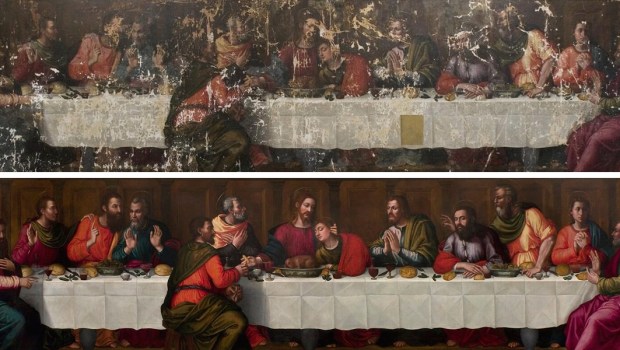Sister Plautilla Nelli’s paintings were so popular in the 16th-century that just about every villa in Florence featured her enormous works.
Lenten Campaign 2025
This content is free of charge, as are all our articles.
Support us with a donation that is tax-deductible and enable us to continue to reach millions of readers.
After nearly a century of storage in less than ideal conditions, a 21-foot oil painting of the Last Supper has been fully restored and placed on display at the Basilica of Santa Maria Novella. The work, by the premere 16th-century female artist Plautilla Nelli, is the only surviving work that still bears her signature and it is now a prized piece of the Basilica’s storied collection.
Plautilla Nelli was a nun of the Florantine Dominican convent of St. Catherine of Siena. Her artistic style was self-taught and developed through years of solitary trial and error, using masterpieces from Angnolo Bronzino, Andrea del Sarto, and Fra Bartolomeo as examples. Her works are noted for their large scale, which was unusual for female painters of her era, and she is often praised for her attention to detail and ability to capture the emotions of her primarily religious subjects.
Nelli was an exceptional student of anatomy, and her paintings utilize this understanding to accurately capture the beauty of the human form. My Modern Met notes that Nelli’s paintings became so prized by the upper crust of Florentine society that just about every villa featured one of her large depictions of biblical scenes.
In her “Last Supper,” she represented each of the apostles with a unique expression. One of them is staring right at the viewer, which is another rarity as this element was more commonly found in portraits of the time. Equally impressive are the items placed across the long table, each of which is expertly designed, from the glasses of wine to the roast lamb in the centerpiece.
This great painting hung in the St. Catherine of Siena dining hall until its dissolution in the 19th century. It then changed hands several times until it wound up in a warehouse, where it somehow survived a great flood that beset Florence in 1960. The work eventually found its way to the collection of the Basilica of Santa Maria Novella, but it has only recently been restored and placed on display.
The work was completed by Advancing Women Artists, a non-profit all-women group that primarily focuses on preserving important historical artworks from female artists. In an interview with Smithsonian magazine, lead conservator Rossella Lari spoke of Nelli’s style:
“We restored the canvas and, while doing so, rediscovered Nelli’s story and her personality. She had powerful brushstrokes and loaded her brushes with paint.”









